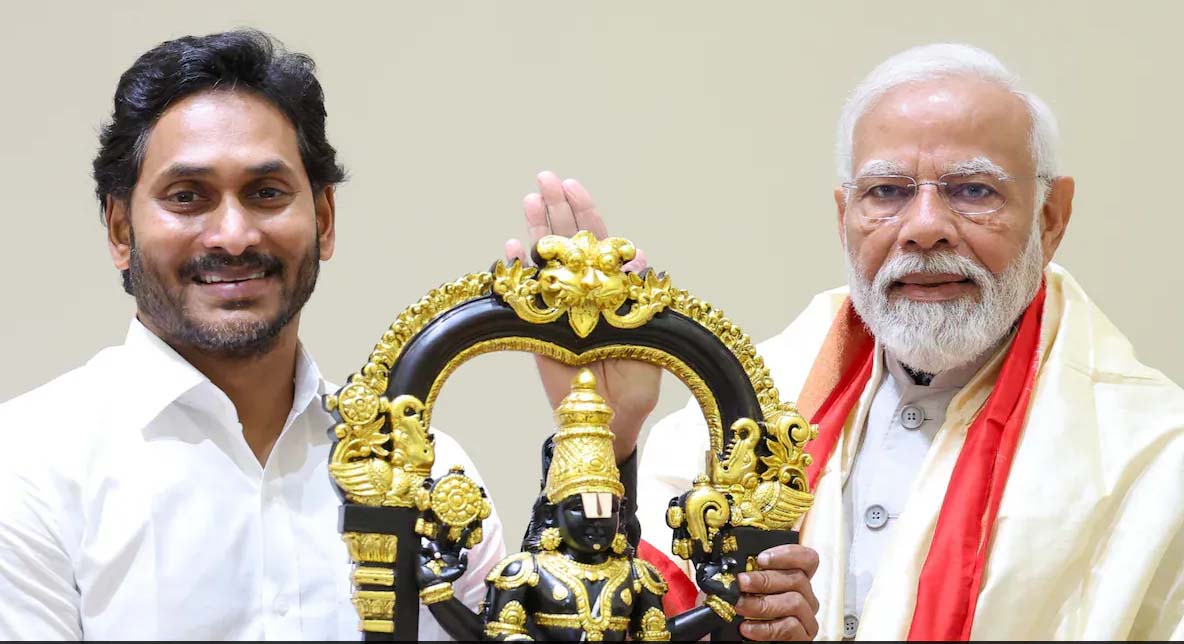In anticipation of an impending Lok Sabha election and a concurrent state poll, an intriguing scenario unfolds in Delhi resembling a swayamvar, as the ruling BJP contemplates a strategic alliance from Andhra Pradesh. Within a mere 24-hour span following a meeting between Telugu Desam Party chief N Chandrababu Naidu, Home Minister Amit Shah, and BJP leader JP Nadda, Chief Minister YS Jagan Mohan Reddy embarks on a journey to Delhi, engaging in discussions with Prime Minister Narendra Modi.
At first glance, Mr. Reddy’s rendezvous with the Prime Minister ostensibly revolves around the discourse on the Special Category status for his state—a longstanding demand echoed by his YSR Congress Party and the TDP—central funds, and sundry other matters. However, analysts speculate that this meeting signifies the BJP’s customary strategy of observation and contemplation, carefully evaluating its options before pledging allegiance to either side or opting for a neutral stance as the elections draw near.
The probable understanding between the BJP and either the YSRCP or the TDP, the latter being in alliance with actor Pawan Kalyan’s Jana Sena in the state, a member of the BJP-led national alliance, is likely to be informal. This informal arrangement may be favored by regional parties, as a formal collaboration poses the risk of alienating minority votes.
Interestingly, this implies that neither Jagan Mohan Reddy nor Chandrababu Naidu desires the swayamvar to culminate in a public matrimony; a discreet handshake may be the preferable denouement.
The BJP, despite lacking political prominence in the state—having suffered a resounding defeat in the 2019 Assembly election, failing to secure a single seat out of the 173 contested—seems to share a similar inclination. A formal alliance with either party may be viewed favorably, but it presents its own set of challenges, with seat-sharing being the most formidable obstacle. Both the YSRCP and the TDP are likely to resist ceding seats to the saffron party, wary of diminishing their potential contested seats-to-win ratio.
Given the BJP’s subpar performance from five years ago and its substantial defeat in neighboring Telangana in the previous year, it may not hold the strongest negotiating position. Thus, while a behind-the-scenes agreement appears more probable, Chandrababu Naidu’s prospects of garnering support are perceived as inferior to those of his state adversary. The BJP appears to be distancing itself from him, given his exit from the party-led National Democratic Alliance on two occasions, the most recent being in 2018 when facing pressure from Mr. Reddy on the Special Category status issue. At that time, the BJP had declared that the “doors are closed forever (for the Andhra Pradesh party).”
Moreover, Mr. Naidu faces legal challenges, making alignment with the ruling party at the center a more appealing prospect. Consequently, he has been extending overtures to the BJP.
This potentially leaves Mr. Reddy in the lead, though he may only seek ‘associate member’ status. He is unequivocal in his pursuit of the best possible outcome for his state, expressing a hope, akin to his stance before the 2019 Lok Sabha poll, that no party secures a clear majority in the national election. This would provide Andhra Pradesh with the flexibility to negotiate with whichever alliance assumes control of the central government.
Ultimately, it appears that the BJP will emerge victorious, irrespective of the direction in which Andhra Pradesh voters lean. Its support is anticipated from ‘B’ (for Chandrababu Naidu), ‘J’ (for Jagan Mohan Reddy), and ‘P’ for Pawan Kalyan, as all three are poised to align with the BJP.
Meanwhile, within the BJP ranks, opinions diverge on the party’s strategy and the necessity of forming an alliance in Andhra Pradesh. One faction, including the state unit leader Daggubati Purandeswari, advocates for an alliance, while another sees going solo as an opportunity to establish a foothold in the state. This rationale is rooted in the fact that the Congress, much like the BJP, has been largely inconspicuous in the state since 2014, and it is endeavoring to rejuvenate its prospects, relying on the political entry of Mr. Reddy’s sister, YS Sharmila.




